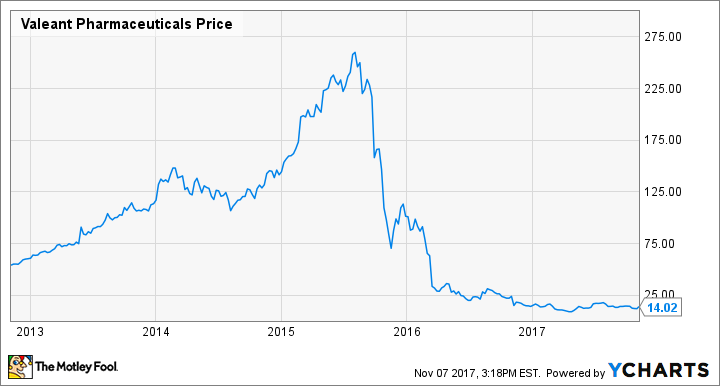Valeant Pharmaceuticals' (BHC 0.35%) is knee-deep in a transformation that it hopes will allow it to regain its top-tier status with investors. The company's selling assets and funneling cash flow into debt prepayments to rein in its interest expense, and its third-quarter financials suggest it's making progress. Is this stock finally safe to buy?
A short-seller's delight
Valeant's prior management employed an aggressive acquisition and marketing strategy that began unraveling after investigations revealed an all-too-close-for-comfort relationship with its specialty drug distributor and allegations of improper prescription fulfillment and reimbursement practices.

IMAGE SOURCE: GETTY IMAGES.
Fallout from the revelations caused the company's board to jettison top executives and reverse course on its marketing plan, and while both of those decisions were necessary, neither helped prevent a significant drop-off in sales and EBITDA.
With tens of billions of dollars in debt forcing the company to pay out hundreds of millions per quarter in interest and declining sales crunching cash flow, short-sellers turned Valeant Pharmaceuticals into one of the most hated stocks on Wall Street. A record 49 million shares of Valeant Pharmaceuticals were held in the hands of short-sellers earlier this year, up from less than 3 million shares short in 2014, and many of those short-sellers pocketed big profits, as the company's share price tumbled from more than $200 to less than $10 at their low.
Beginning to turn?
One of the big concerns about Valeant Pharmaceuticals has been its ability to keep its nose above EBITDA interest coverage mandates. To avoid the risk of being in default of its debt, Valeant Pharmaceuticals has to generate more 1.5 times more EBITDA than it pays out in quarterly interest.
The company had been flirting with failing to maintain that threshold. However, it began making headway in the second quarter, and in the third quarter, it remained above the floor despite slipping sales.
Valeant Pharmaceuticals' third-quarter revenue fell 10.5% year over year to $2.2 billion, but sales at its core Bausch & Lomb and Salix businesses improved. Bausch & Lomb sales inched up 0.9% to $1.25 billion, and Salix sales were up 3% from last year.
The company's drop in revenue this past year was largely due to decisions to sell various products to raise money to pay off debt, along with lower sales for some of its other drugs because of increased generic-drug competition. Revenue in its branded Rx business fell 17.4% year over year to $633 million, and sales in its U.S. diversified products segment fell 29.4% to $332 million because of asset sales and competition.
As for the company's bottom-line performance, a slate of one-time items -- including a massive tax benefit -- suggest it's probably more useful to consider non-GAAP figures that back out the impact of those items. In that respect, net income fell 28% to $367 million in Q3 from last year.
In terms of EBITDA, GAAP EBITDA was $756 million in the quarter. Non-GAAP adjusted EBITDA was $951 million, down $212 million from one year ago. Since net interest expense was $459 million, the EBITDA-to-interest coverage ratio was 1.66 on a GAAP basis and 2.08 on a non-GAAP basis exiting the quarter.
Remaining trouble spots
Divestitures and cash flow have been used to reduce debt by $6 billion since Q1. However, debt restructurings at less favorable terms have offset much of the benefit of declining debt on interest expense. Net interest expense of $459 million in Q3 2016 was lower than the $467 million spent last year, but interest expense through the first nine months of 2017 was $1.38 billion, up from $1.36 billion in 2016.
The year-over-year decline in interest expense is encouraging, though. It's also encouraging that the company's continuing to kick off nearly $500 million in quarterly cash flow and that it doesn't have any long-term debt maturing until 2020.
The bad news is that falling sales will continue putting pressure on the company's profitability until things improve at the company's branded Rx and diversified-brands businesses, or new drugs begin contributing materially to revenue at Bausch & Lomb. Although Valeant Pharmaceuticals has done a solid job of controlling expenses as sales have fallen, it hasn't been able to fully absorb the hit. As a result, adjusted cost of goods sold as a percentage of sales increased 3% to 30% year over year, and SG&A to sales has increased 1% year over year.
Overall, the company's executing on its turnaround, but it's slow going. Its shares appear to be benefiting from short covering as a default gets less likely, but revenue and profit declines still make it too tough to argue that this is the best stock for long-only investors to buy.






